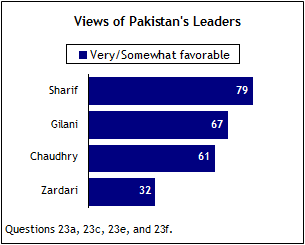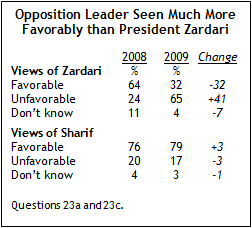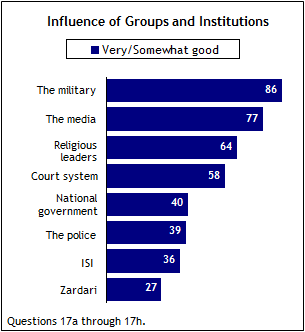 Views of President Asif Ali Zardari have turned negative in the past year, as he has made the transition from new widower of former Prime Minister Benazir Bhutto to leader of a troubled nation. The once-popular Zardari is now viewed unfavorably by a majority of Pakistanis. Opposition leader Nawaz Sharif remains widely popular, and Prime Minister Yousaf Raza Gilani and newly-reinstated Chief Justice Iftikhar Muhammad Chaudhry also receive favorable ratings from solid majorities of Pakistanis.
Views of President Asif Ali Zardari have turned negative in the past year, as he has made the transition from new widower of former Prime Minister Benazir Bhutto to leader of a troubled nation. The once-popular Zardari is now viewed unfavorably by a majority of Pakistanis. Opposition leader Nawaz Sharif remains widely popular, and Prime Minister Yousaf Raza Gilani and newly-reinstated Chief Justice Iftikhar Muhammad Chaudhry also receive favorable ratings from solid majorities of Pakistanis.
Pakistanis hold their country’s military in high regard, and most also express positive attitudes about the media, religious leaders, and the court system. The national government, on the other hand, is now viewed as having a negative influence by a majority in Pakistan.
Zardari vs. Sharif
 Nearly two-thirds of Pakistanis (65%) offer an unfavorable opinion of Zardari and just 32% give the president a favorable rating. In April 2008, before Zardari announced his candidacy for president, 64% had a positive opinion of him and 24% had a negative opinion.
Nearly two-thirds of Pakistanis (65%) offer an unfavorable opinion of Zardari and just 32% give the president a favorable rating. In April 2008, before Zardari announced his candidacy for president, 64% had a positive opinion of him and 24% had a negative opinion.
Unfavorable views of Zardari are widespread across most demographic groups. And even among those who are affiliated with the Pakistan Peoples Party (PPP), which Zardari co-chairs with his son, views of the president are mixed. A small majority (52%) offers a positive opinion and 45% offer a negative opinion of Zardari.
Nawaz Sharif, on the other hand, continues to enjoy high favorable ratings from the Pakistani public. About eight-in-ten (79%) have a positive opinion of Zardari’s political rival and 17% have a negative opinion, largely unchanged from last year. While Sharif receives near unanimous support from those affiliated with his party – 98% in the Pakistani Muslim League-Nawaz (PML-N) offer a favorable opinion – he also enjoys broad support from those in the PPP (71% favorable).
Prime Minister, Chief Justice Viewed Favorably
While Pakistanis express largely negative views of their country’s president, Prime Minister Yousaf Raza Gilani, vice-chairman of Zardari’s party, is widely popular. Two-thirds have a favorable opinion and just 19% have an unfavorable opinion of the prime minister, who has sought to distance himself from Zardari on some issues in recent months. Gilani is well-regarded by members of the two leading political parties – 69% of those in the PPP see the prime minister in a positive light, and even more (78%) in the PML-N, the opposition party, share that view.
Iftikhar Muhammad Chaudhry, who was recently reinstated as Pakistan’s Chief Justice after being suspended and placed under house arrest by former President Pervez Musharraf, also receives positive ratings from a clear majority of Pakistanis. About six-in-ten (61%) say they have a favorable opinion of Pakistan’s chief justice, while 18% say they have an unfavorable impression. More than one-in-five (22%) did not offer an opinion.
Views of Groups and Institutions
 Fully 86% say the military is having a good influence on the way things are going in Pakistan, up from 68% in 2007. More than three-quarters (77%) also see the media as having a positive impact, and somewhat smaller majorities say the same about religious leaders (64%) and the court system (58%).
Fully 86% say the military is having a good influence on the way things are going in Pakistan, up from 68% in 2007. More than three-quarters (77%) also see the media as having a positive impact, and somewhat smaller majorities say the same about religious leaders (64%) and the court system (58%).
On the other hand, just 40% say the national government is having a good influence on the way things are going in Pakistan, while slightly more than half (53%) say it is having a bad influence. Views of the national government have become more negative over the years. In 2002, more than seven-in-ten said the national government (72%) was having a positive influence on the way things were going in Pakistan, while 19% saw it as having a bad influence. By 2007, about one-third (32%) said the national government was having a negative impact on the way things were going in Pakistan.
President Zardari receives even more negative ratings than the national government – about two-thirds (68%) see the president as having a bad impact. By contrast, in 2007, just 36% said President Pervez Musharraf was having a negative influence on Pakistan and more than half (56%) said he was having a good influence.
The Pakistani police also receive low marks from the public – 55% say it is having a negative influence and 39% say it is having a positive influence on the way things are going in the country. Just 36% see the Directorate for Inter-Services Intelligence (ISI) as having a good impact, but 41% did not offer an opinion about the agency.


